

4 Phases of Inquiry-Based Learning: A Guide For Teachers. According to Indiana University Bloomington, Inquiry-based learning is an “instructional model that centers learning on a solving a particular problem or answering a central question.
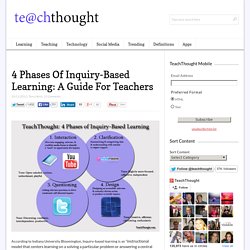
There are several different inquiry-based learning models, but most have several general elements in common: Learning focuses around a meaningful, ill-structured problem that demands consideration of diverse perspectivesAcademic content-learning occurs as a natural part of the process as students work towards finding solutionsLearners, working collaboratively, assume an active role in the learning processTeachers provide learners with learning supports and rich multiple media sources of information to assist students in successfully finding solutionsLearners share and defend solutions publicly in some manner” The process itself can be broken down into stages, or phases, that help teachers frame instruction.
How BYOD Programs Can Fuel Inquiry Learning. Digital Tools Erin Scott Launching a Bring Your Own Device program can be both exhilarating and scary.
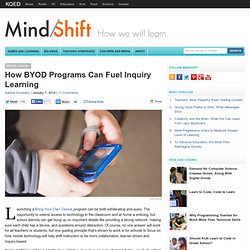
The opportunity to extend access to technology in the classroom and at home is enticing, but school districts can get hung up on important details like providing a strong network, making sure each child has a device, and questions around distraction. Of course, no one answer will work for all teachers or students, but one guiding principle that’s shown to work is for schools to focus on how mobile technology will help shift instruction to be more collaborative, learner-driven and inquiry-based.
“Instead of this just being a technology initiative, it really is an instructional initiative, so all of us from different departments can get on the same page,” said Tim Clark, coordinator of instructional technology for Forsyth County Schools in Georgia. Forsyth started out by creating a learner profile, a set of criteria the school district wanted students to learn while in school. Related. 36 Core Teacher Apps For Inquiry Learning With iPads. 36 Core Teacher Apps For Inquiry Learning With iPads The interest in inquiry-based learning seems to ebb and flow based on–well, it’s not clear why it ever ebbs.
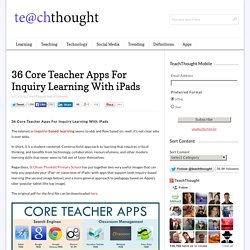
In short, it is a student-centered, Constructivist approach to learning that requires critical thinking, and benefits from technology, collaboration, resourcefulness, and other modern learning skills that never seem to fall out of favor themselves. Regardless, St Oliver Plunkett Primary School has put together two very useful images that can help you populate your iPad–or classroom of iPads–with apps that support both inquiry-based learning (the second image below), and a more general approach to pedagogy based on Apple’s uber-popular tablet (the top image). The original pdf for the first file can be downloaded here. A101_Edelson_etal_99. BBB%20Balance%20Healey. Inquiry-based Learning: Explanation. What is inquiry-based learning?
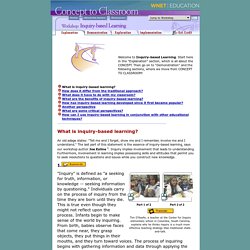
An old adage states: "Tell me and I forget, show me and I remember, involve me and I understand. " The last part of this statement is the essence of inquiry-based learning, says our workshop author Joe Exline 1. Inquiry implies involvement that leads to understanding. Furthermore, involvement in learning implies possessing skills and attitudes that permit you to seek resolutions to questions and issues while you construct new knowledge. "Inquiry" is defined as "a seeking for truth, information, or knowledge -- seeking information by questioning. " A Context for Inquiry Unfortunately, our traditional educational system has worked in a way that discourages the natural process of inquiry. Inquiry Based Learning. JIBLM.org - Journal of Inquiry-Based Learning in Mathematics - IBL Course Notes in Mathematics.
Inquiry-based Learning: Demonstration. Inquiry-Based Lesson Plans. Inquiry Learning Student understanding is the central focus of inquiry learning.
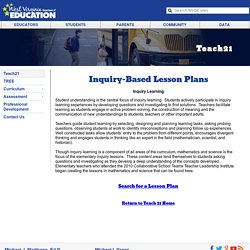
Students actively participate in inquiry learning experiences by developing questions and investigating to find solutions. Teachers facilitate learning as students engage in active problem solving, the construction of meaning and the communication of new understandings to students, teachers or other important adults. Teachers guide student learning by selecting, designing and planning learning tasks, asking probing questions, observing students at work to identify misconceptions and planning follow up experiences. Well constructed tasks allow students’ entry to the problem from different points, encourages divergent thinking and engages students in thinking like an expert in the field (mathematician, scientist, and historian). Investigating Animals: Using Nonfiction for Inquiry-based Research. ReadWriteThink couldn't publish all of this great content without literacy experts to write and review for us.
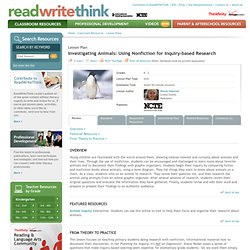
If you've got lessons plans, activities, or other ideas you'd like to contribute, we'd love to hear from you. More Find the latest in professional publications, learn new techniques and strategies, and find out how you can connect with other literacy professionals. More Teacher Resources by Grade Your students can save their work with Student Interactives. OER Commons. Learning Science Through Inquiry. Frequently Asked Questions About Inquiry Workshop 1 | Workshop 2 | Workshop 3 | Workshop 4 | Workshop 5 Workshop 6 | Workshop 7 | Workshop 8 Contributing Authors:
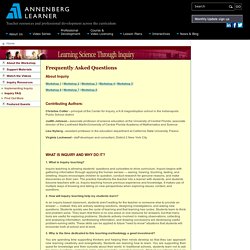
Inquiry Based Learning Projects on Pinterest. Inquiry-Based Learning. Galileo Educational Network. Inquiry learning & information literacy. What is Inquiry-based Learning? We learn best when we are at the center of our own learning.
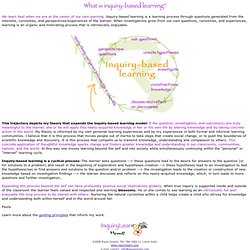
Inquiry-based learning is a learning process through questions generated from the interests, curiosities, and perspectives/experiences of the learner. When investigations grow from our own questions, curiosities, and experiences, learning is an organic and motivating process that is intrinsically enjoyable. This trajectory depicts my theory that expands the inquiry-based learning model: If the question, investigation, and outcome(s) are truly meaningful to the learner, she or he will apply this newly-acquired knowledge in her or his own life by sharing knowledge and by taking concrete action in the world. My theory is informed by my own personal learning experiences and by my experiences in both formal and informal learning communities. I believe that it is this process that moves people out of inertia to take steps that create social change, or to push the boundaries of scientific knowledge and discovery.
Paula. Inquiry Learning Definition. Inquiry learning is an approach that provides learners opportunities to actively develop skills that enable them to locate, gather, analyse, critique and apply information in a wide range of contexts. as they develop understanding.
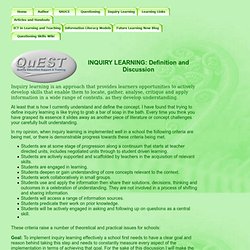
At least that is how I currently understand and define the concept. I have found that trying to define inquiry learning is like trying to grab a bar of soap in the bath. Every time you think you have grasped its essence it slides away as another piece of literature or concept challenges your carefully built understanding. In my opinion, when inquiry learning is implemented well in a school the following criteria are being met, or there is demonstrable progress towards these criteria being met. Students are at some stage of progression along a continuum that starts at teacher directed units, includes negotiated units through to student driven learning. These criteria raise a number of theoretical and practical issues for schools: Guided Inquiry - CISSL. Kim, Sun Un & Todd, R.
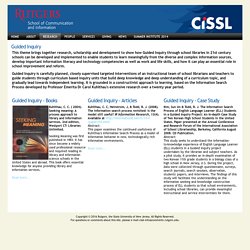
J. The Information Search Process of English Language Learner (ELL) Students in a Guided Inquiry Project: An In-depth Case Study of Two Korean High School Students in the United States. Paper presented at the Annual Conference and Research Forum of the International Association of School Librarianship, Berkeley, California August 2008.
CD Publication. Abstract: This study seeks to understand the information-to-knowledge experience of English Language Learner (ELL) students in a Guided Inquiry project undertaken by the librarian and subject teachers. Intro to Inquiry Learning. A (Somewhat) New Approach to Educating and Inspiring Kids Inquiry-based learning is not a new technique—in fact, it goes back to education philosopher John Dewey—but it does stand in contrast to the more structured, curriculum-centered framework of today's schools. Asking questions is at the heart of inquiry-based learning. The goal is not to ask just any questions, of course, but ones that kids honestly care about.
Your role is to guide the kids in finding the answers themselves and encourage them to ask new questions along the way. Download Free Science Activities, Find information on Workshops, Learn Chemistry Fundamentals. Eequalsmcq - The Lab of Mister Q - Homeschool Science and other Education Resources. The Thinking Classroom. Professional Development: 12 Tips for Inquiry-Based Learning. Inquiry-based learning is a style of teaching that is based on asking questions that kids honestly care about and guiding them to find the answers as well as coming up with new questions along the way.
Dewey’s description of the four primary interests of the child are still appropriate starting points: the child’s instinctive desire to find things out in conversation, the propensity children have to communicate in construction, their delight in making things in their gifts of artistic expression. It makes sense to teach this way. However, it takes more than just letting go and letting students choose questions. The first year you implement inquiry-based learning is a big paradigm shift.
Plan enough time to pre-plan, plan, and plan again during implementation. Learning begins with the learner. Professional Development in Action - Inquiry-based Learning. Inquiry-based Learning: Explanation. What is inquiry-based learning? An old adage states: "Tell me and I forget, show me and I remember, involve me and I understand. " The last part of this statement is the essence of inquiry-based learning, says our workshop author Joe Exline 1.
Inquiry implies involvement that leads to understanding. Furthermore, involvement in learning implies possessing skills and attitudes that permit you to seek resolutions to questions and issues while you construct new knowledge. Inquiry. What is Inquiry? Inquiry learning provides opportunities for students to experience and acquire processes through which they can gather information about the world. This requires a high level of interaction among the learner, the teacher, the area of study, available resources, and the learning environment. Students become actively involved in the learning process as they: act upon their curiosity and interests; develop questions; think their way through controversies or dilemmas; look at problems analytically; inquire into their preconceptions and what they already know; develop, clarify, and test hypotheses; and, draw inferences and generate possible solutions.
Blooms Taxonomy Action Verbs. CBS_InquiryBased. Examples of Inquiry Based Lessons. Teaching as inquiry / Inquiry / Case studies / Curriculum stories / The New Zealand Curriculum Online - NZ Curriculum Online. Overview | The focusing inquiry | The teaching inquiry | The learning inquiry | References If you cannot view or read this diagram select this link to open a text version >> Overview The New Zealand Curriculum (pages 34–35) and Te Marautanga o Aotearoa (pages 13–16) describe some of the teaching approaches that research shows to have a consistently positive impact on student learning. However, they stress that there is no formula that will work for every student in every situation. Since any teaching strategy works differently in different contexts for different students, effective pedagogy requires that teachers inquire into the impact of their teaching on their students.
Ministry of Education, 2007b, page 35 The fundamental purpose of the Teaching as Inquiry cycle is to achieve improved outcomes for all students. In the focusing inquiry, teachers identify the outcomes they want their students to achieve. What does the literature say? Example from QTR&D. The Challenges and Realities of Inquiry-Based Learning. - Create a Culture of Questioning and Inquiry. 4 Comments August 14, 2013 By: Guest Blogger Nancy White Aug 13. Why Inquiry Learning is Worth the Trouble.
Visualization of SLA principal Chris Lehmann's 2011 talk: guiding kids' to thinking about how they think. Nearly seven years after first opening its doors, the Science Leadership Academy public magnet high school* in Philadelphia and its inquiry-based approach to learning have become a national model for the kinds of reforms educators strive towards. But in a talk this past weekend at EduCon 2.5, the school’s sixth-annual conference devoted to sharing its story and spreading its techniques, Founding Principal Chris Lehmann insisted that replicating his schools approach required difficult tradeoffs. Inquiry Learning Vs. Standardized Content: Can They Coexist? By Thom Markham As Common Core State Standards are incorporated from school to school across the country, educators are discussing their value.
It may seem that educators are arguing over whether the CCSS will roll out as a substitute No Child Left Behind curriculum or as an innovative guide to encourage inquiry rather than rote learning. In reality, as time will prove, we’re arguing over whether content standards are still appropriate. Creating Classrooms We Need: 8 Ways Into Inquiry Learning. If kids can access information from sources other than school, and if school is no longer the only place where information lives, what, then happens to the role of this institution? “Our whole reason for showing up for school has changed, but infrastructure has stayed behind,” said Diana Laufenberg, who taught history at the progressive public school Science Leadership Academy for many years. Web-based Inquiry Science Environment (WISE) Java UpdateJan 15, 2014 On January 14, 2014, a new version of Java was released.
A study of learning and motivation in a new media enriched environment for middle school science. Grade Level Websites - Social Studies Project. 1.1.1 Value self and others as unique individuals in relation to their world… Belonging to Groups This website offers lessons and activities to cover the concepts involving: identity, self, groups, similarities, differences, and cooperation. Understanding Other Cultures Around the World Kidland encourages creative expression and cross-cultural understanding among the world's children.
Anyone in the world can enjoy watching kids interact and learn from them. SPS Inquiry Circles - 7-8. Social Studies Lessons - Inquiry-based Learning. Inquiry-Based Approaches: What Do Students Think? Www.edutopia.org/pdfs/edutopia-teaching-for-meaningful-learning.pdf. 10 Tips for Inquiry-Based Learning. Inquiry-Based Approaches: What Do Students Think?